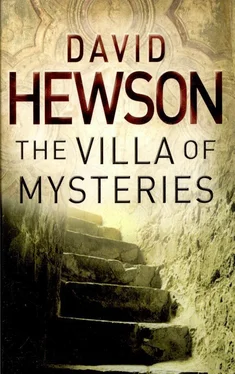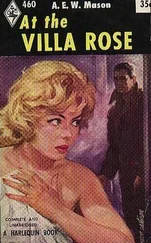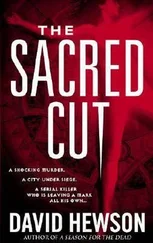They stormed out of the house, out into the street, pushing past the TV van which was still backed up against the ruined door. The media mob was almost gone now. There were just a handful of cops, in uniform and out, waiting outside, looking uncomfortable, guilty that they’d overheard the argument.
“You can stand down,” Falcone told them. “This is a DIA deal for the time being. Let’s get back to the Questura. See what’s happening with the phones.”
The men nodded. They’d caught the atmosphere.
“Stupid, stupid, stupid,” Falcone repeated as they walked to the car.
“They just got their priorities, Leo,” Peroni observed and got a cold, hard glance for his pains. “Sorry, sir . You can’t expect anything else. The kid and me could go back in there and watch for a while.”
“No point,” Falcone said. “She’ll let us know if she finds something. How would it look otherwise? Besides—” He needed to get this clear in his own head too. “There can’t be a damn thing there that’s any use to us. Neri had this planned, right down to the last detail. He’s making monkeys of us. He’d love it if we stayed in that place, peeking under the carpet, scraping through dust.”
“Yeah,” Peroni agreed. “I can see that. Sorry, I still find it hard trying to think like you people. It’s all so damn sneaky .”
Costa’s phone rang. He stepped aside so that he could hear the anxious voice on the other end.
“Why did Neri set this up?” Falcone wondered. It was all too small. It just caused the police some embarrassment, and Neri had to be above that. The media didn’t even hang around once they realized there was no big arrest coming, no sign of the fat old hood being led out in handcuffs, bundled into a car, head down for the cameras. They’d disappeared altogether.
Apart from the van.
“Boss,” Costa said anxiously. “I think we’ve got something. An anonymous call just came in. Someone looking just like Suzi. No more than half an hour ago.”
“Where?” Falcone asked, still thinking about what had just happened, trying to make some connections.
“Somewhere along Cerchi. Didn’t get an exact position.”
“Quite some road,” Peroni said. “We could spend all night going up and down there.”
Cerchi ran the length of the Circus Maximus, now an empty, stadium-shaped field behind the Palatine Hill, overlooked by the ruins of Augustus’s palaces.
Costa remembered what Teresa had said about Regina Morrison. “Kirk and Mickey could have used old archaeological digs if they wanted to. We can talk to his boss at the university. She should have a list of everywhere he worked.”
“Get her,” Falcone ordered. He reached the car, put his hand on the door, still thinking. “Chase it, Nic. Let’s go there straightaway. This place is dead.”
He looked back at the street. They were parked a good fifty metres from Neri’s door. There wasn’t a TV crew in sight. The van was still there, up at an angle over the pavement.
“See the vehicle at the front door?” Falcone asked. “Either of you notice someone using it? Any of those TV bastards go near at all?”
“Not me,” Peroni answered, puzzled.
Falcone looked at Costa, his mind full of possibilities.
“Me neither,” Costa replied. “What do you think—”
He didn’t finish the sentence. The earth began to tremble beneath their feet, cobblestones shaking as if hit by an earthquake. Then came a roar so loud it was unreal, a physical wall of audible fury burying itself deep in their heads.
A fierce, fiery tongue leapt out of the rear end of the van. The vehicle rose off the ground as if tugged towards the sky by an invisible force. For a brief moment the world stood still, then a cacophony of furious noise hit them, followed by a vicious, punishing force as hard as a fist.
When it ended Costa was on the cold hard ground, holding his hands to his ears, stunned, panting too. Peroni leaned against the car, mouth open, looking shell-shocked, gasping for air. And Falcone was running, frantically, as fast as he could, back towards Neri’s house where a firestorm now raged out of the blackened, torn tangle of wreckage that was the van, flames licking greedily up into the shattered remains of the building.
Costa staggered in his footsteps, Peroni behind him. The air stank of smoke and the chemical smell of spent explosives. Car alarms, triggered by the shock wave of the blast, sounded all around. A man was screaming in the gutter, clutching at his stomach. Two others lay still on the ground. A team of uniformed officers materialized from a riot van around the corner, wondering where to begin.
It was impossible to think. Nic Costa looked at the faces of the men around him, faces locked hard in shock, and found it impossible to recognize any of them. In this sudden burst of insanity the world had become anonymous, simply a receptacle for its victims.
The blast had taken out two floors of the building. As the dust and debris cleared Costa could see, in the dim streetlights, entire rooms in Neri’s house now laid open to the elements: tables and chairs, a TV set, a kitchen cut in half by the savagery of the explosion. Flames raged in and out of the severed quarters. Somewhere on the second floor a dark figure danced crazily, as if trying to dodge the blaze that engulfed him, until he fell to the floor, rolled right off the edge and into the dust storm milling around the van.
Leo Falcone was fighting at the mountain of rubble which occupied the spot that, moments before, had been Emilio Neri’s front door, clawing at the bricks, snatching them out of his way one by one.
There was a broken body in front of him, poised at an impossible angle, a slender arm, bloodied, blackened by the blast, quite still in the smoking debris.
A small, calm voice spoke at the back of Nic Costa’s head and it said: think .
As the ambulances arrived, as a screaming fire engine bathed in blue light wove through the cars thrown into the road by the bomb, Nic Costa scanned his notes, found the number, then walked into the relative quiet of an antiques shop doorway to place the call.
“Miss Morrison,” he said when he heard the clipped female voice answer. “You don’t know me but I’m a friend of Teresa Lupo’s, a detective. I really need to talk—”
THERE WAS LIVE FOOTBALL on the TV: Roma versus Lazio. The big local derby. Roma were beating the crap out of their neighbours. Again. Toni Martelli could hear people yelling with delight in the neighbouring apartments. He was a Lazio man himself. For him Roma were still the team of the lower classes, the rabble, the people who ran things these days. Not that Martelli had been to a game in years. Now that he was out of the force he’d lost all the favours. With Barbara gone, he couldn’t even sponge a few off her.
Falcone had been on the phone earlier saying he could probably release the body for cremation within a week. Sooner if Martelli had something to say. Martelli had told him where he could shove his offer. The girl was dead. What else was there to talk about?
Then came another call with news he half expected to hear. And so he locked himself in the over-large apartment, snuggling up to some cigarettes and a bottle of grappa he’d had sent round from the bar on the corner, waiting, watching the game on the TV, war disguised as sport, brute humanity pretending it was something else, something noble and elegant, like a savage trying to dance ballet.
The key started to turn in the door just after ten, rattling around clumsily as someone fumbled trying to get in.
“Cowboys,” Martelli sniffed. “They don’t even have the decency to send a real man.”
He turned off the TV and the light by his side, making the room appear the way he had planned. He now sat in his wheelchair in the dark. It was not easy to see. He’d angled the two big standard lamps in the living room so they shone towards the door at the end of the corridor. The man would have to walk straight into the light, maybe shade his eyes a little. Toni Martelli had thought this through. He half-guessed what the outcome would be but he didn’t plan on making it easy.
Читать дальше












